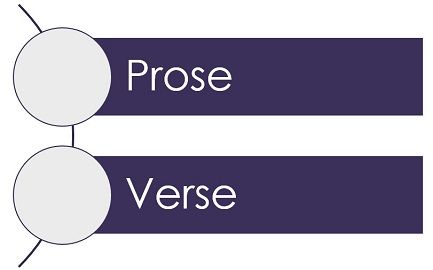 Do you guys know that we use prose, in our normal day to day speech, writing and thinking? It is a style in which we naturally communicate and follows the grammatical structure. The prose is a common term used for unmetrical writing.
Do you guys know that we use prose, in our normal day to day speech, writing and thinking? It is a style in which we naturally communicate and follows the grammatical structure. The prose is a common term used for unmetrical writing.
On the other hand, a Verse is used for metrical writing, no matter if the writing is poetic or unpoetic. A verse uses a rhythmic structure, which is not used in ordinary speech. In this session, we will learn the differences between prose and verse.
What is a Meter?
In a poetic composition, meter refers to an organized unit of rhythm, which is also called as the foot. It is the typical pattern of syllables, which establishes a rhythm.
What is Rhythm?
Rhythm is the patterned flow of words and phrases, in literary composition, often ascertained by long or short, stressed or unstressed syllables.
Content: Prose Vs Verse
Comparison Chart
| Basis for Comparison | Prose | Verse |
|---|---|---|
| Meaning | Prose refers to the language in its basic form having no metrical structure. | The verse implies the literary work, which is organized using metrical rhythm. |
| What is it? | A form of text. | A form of poetic composition |
| Rhyme | Does not play an important role. | Plays a significant role. |
| Language used | Natural language is used. | Creative and rhythmical. |
| Comprises of | Sentences and paragraphs | Lines and stanzas. |
| Written by | Author/writer | Poet |
| Approach | Pragmatic or Direct | Aesthetical |
Definition of Prose
The prose is a type of literary genre, having a simple and loosely defined structure, often found in day to day speech and communication.
In simple words, it is a written or spoken language in its ordinary form, without any formal metrical structure
In prose, a natural flow of speech and fundamental grammatical rules are followed. This means that it contains sentences and paragraphs which are grammatically correct. Further, prose uses everyday language which is clear and straightforward and avoids the aesthetical approach. In prose, the thought flows across the sentences.
It is a general form of writing which is used in both fictional and non-fictional work of literature. Examples of prose include novels, encyclopedias, textbooks, articles, casual dialogues, dictionary definition, etc.
Types of Prose
There are four basic types of prose, given as under:
- Non-fictional Prose: Literary composition containing fact-based material or the one based on a true story, event or information is nonfictional prose.
- Fictional Prose: Fictional prose is one which is fully or partially fictional, i.e. imaginary. It may include novels, short stories, etc.
- Heroic Prose: Literary composition, written or recited, having a set form of words, often found in oral tradition.
- Prose Poetry: Literary work indicating poetic quality making use of emotional effects and highly intense figurative language. It is a hybrid form which combines both prose and poetry.
Definition of Verse
A verse can be understood as a literary composition representing one line poetry, which has a definite rhythm. It is used to indicate any stanza or any other part of the poetry. A verse can also be understood as a line of metrical writing, which denotes any combination or arrangement of works in poetry, whose grouping is technically called ‘stanza’.
A poem may contain several verses. It is a series of lyrics which explain the essence of the poem, as well as it keeps the thought going. It requires an arrangement of words in a definite pattern, so as to produce a harmonious rhythm.
Types of Verse
The verse can be of two types – free verse and blank verse, which are discussed as under:
- Free Verse: A free verse is one which does not have any set meter, which means that the rhyming scheme is absent and the poem has no specific pattern.
- Blank Verse: In blank verse, there exists an iambic pentameter, but it is unrhythmical. It is mainly used to show passionate events as well as to attract the reader.
Key Differences Between Prose and Verse
The difference between prose and verse is discussed in the points below:
- Any type of literary work, which follows the simple grammatical structure, to form sentences and paragraphs is called prose. As against, when words are metrically arranged in a sequence, as per a given design or rhythm, it is called verse.
- While the prose is a form of text, the verse is a form of poetic composition.
- Rhyme and rhythm play a significant role in verse, whereas there is no rhyme or rhythm in a verse.
- In prose, natural language is used which has to be grammatically correct. On the contrary, in a verse creative and rhythmical language is used.
- In prose, words are arranged in sentences, which form a paragraph. However, in a verse, words are organized in lines, i.e. a single metrical line, or group of lines i.e. stanzas.
- The prose is written by an author or writer, while verses are written by a poet.
- Prose follows a practical or direct approach for sentence construction. In contrast, an aesthetical approach is followed in verse.
Conclusion
To sum up, the verse refers to the single line of the poem, or any combination of words in a poem. But the prose is a large piece of writing, not having a consistent rhythm.
The prose is meant to imitate natural speech and communication. But, verses stress on producing musical rhythm and cadence.






Brenda Chakuma says
This article has been well elaborated, I like it